- applejuice
- apples
- braeburn
- Christmas
- fatpigfarm
- free range
- jonagold
- Lamb
- markets
- orchard
- orchard lamb
- orders
- pastured
- pay
- picking
- pinklady
- pork
- pruning
- recruitment
- sales
- TAFE
- thinning
- training
- willie smiths
- work
Ethical omnivore

Is one of your new year promises to improve your food habits and ethics? A good way to do that as an omnivore is adopting less waste cooking and taking on the challenge of nose-to-tail eating.
We sell pork sides (halves) where we provide you everything you pay for, including offcuts like trotters, the head (for the brave!), extra skin (spare crackling!), fat (for rendering), and the bones for broth. We have grown our animals with care and attention (if anyone has followed our Instagram stories, they will know what I mean!) and we feel we need to respect the life that we take to sustain ourselves by appreciating all of that animal.
We have January pork sides available right now. Alongside all those yummy offcuts, you get chops, roasts, mince, as well as bacon included. We deliver in the Huon Valley/Channel, with pickups from Bathurst Street for those in Hobart and surrounds.
Hop onto our website for more information and to make your order www.ourmatesfarm.com/contact
#freerangepork #rarebreed #heritagebreed #applefinishedpork #eatyourethics #ethicalomnivore #nosetotaileating #buydirect #buylocal #knowwhereyourmeatcomesfrom
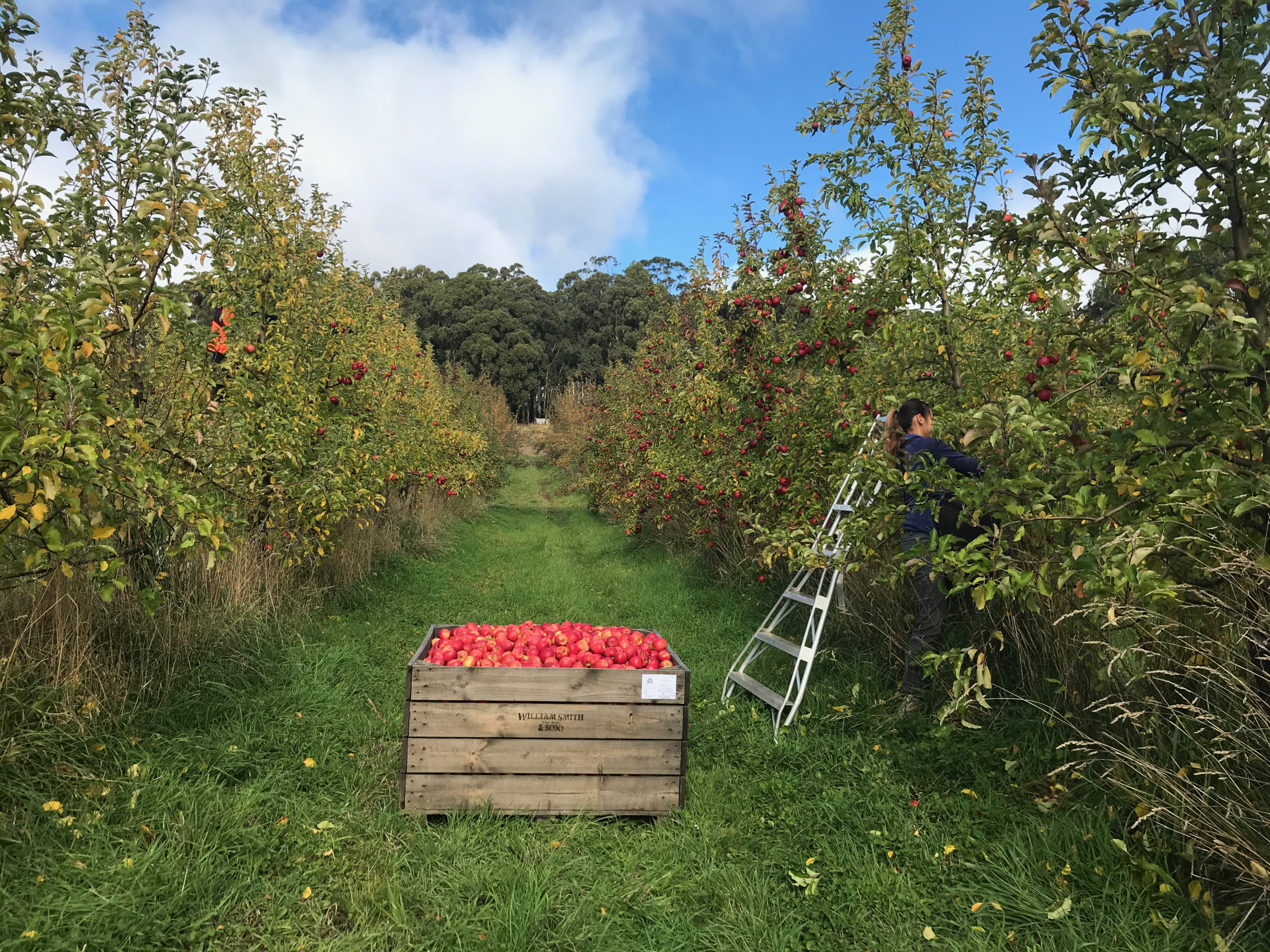
So, you want a job?
I appeared on ABC radio’s Tasmanian Country Hour the other day, talking about how I was lucky to have agricultural work experience growing up and how it gave me an opportunity for work when I was studying. I know a lot of kids today don’t have the same experience, and it has been on my mind for a long time that I should write something to help those looking for work in farming and horticulture. I will speak to apples because it is what I know, but a lot of my advice could apply to cherries and other fruit.
The season
In the Huon Valley, there is casual work year round, but there is more work at some times of year than others. In October to December, organic apple growers use a lot of labour for hand thinning the fruit. This involves taking off a lot of the unripe small apples so the remaining crop can develop properly. This can involve 6-8 weeks of work at the big growers and maybe a few weeks at the small growers. Thinning can be done in any weather.
Cherries are picked in December to January, sometimes running into February depending on the year. I only mention this because if you get a grower who has both cherries and apples then you can fill this January-February gap.
Then in late February through to the end of April apple picking occurs. This is picking fruit using a bag and often ladders, picking up to 15kg at a time and putting it into a wooden bin for collection by a tractor. At the big growers it can be consistent full time work for the whole period, and at the small growers it can be dependent on when certain varieties are ready, sometimes there are breaks of a week or two between varieties. Picking tends to be done only in fine weather.
Outside this season there is pruning, but there is much less of this work and be prepared for cold frosty or rainy conditions with warm waterproof clothing.
What you need
Transport. You need to be able to get to work on time, every time.
After transport the most important thing you need is good footwear. You will be walking in grass that is often wet, a pair of trainers will be soaked in 5 minutes and by 3pm that day you will be tired and fed up, not to mention how it feels pulling them on the next day. Get yourself a pair of short comfortable gumboots (like muck boots or the like), they will keep your feet warm and dry and will make all the difference to your work day.
You will need a waterproof jacket or raincoat (hi-vis is preferred in some orchards), showers are common and can be cold. Bring sunscreen (some growers provide this but it is better to have your own on hand), plenty of water in a water bottle, your own lunch, and maybe a thermos in a backpack.
Finally an ipod/music player and headphones. Nothing slows down work like chatter, and while breaks are a good time to catch up, work pace is everything to a grower. There is an adage that “when the mouth starts the hands stop”. Show yourself to be someone who gets into it and doesn’t chat and you will be first to get the call when work is available.
What you get paid
Keep a record of your own hours or bins or trees written down on a notebook or your phone. Growers have a lot to keep track of so if you take a longer lunch or arrive early it can sometimes be hard for them to remember come pay day. Help them out and they will appreciate it.
What you get depends on the sort of work you are doing, and you need to establish this early.
The casual hourly rate is $24.36 (this will change on November 1). Many employers will pay the hourly rate for thinning, and the contract rate for picking. The contract rate is supposed to be agreed between the employee and employer, so that an average employee can make 15% more than the hourly rate. Sometimes a contract rate per tree may be used for thinning or pruning, but again it must be determined by the rate of an “average employee”. Depending on bin size and the type of picking, the bin rate for picking starts at $37.95 and goes up to $46.09 per bin.
Superannuation of 9.5% must be paid for employees who earn more than $450 in a month. Don’t just check your payslip, check your super account balance after each quarter.
A warning
I hate to say it, but there are still farmers and growers who do the wrong thing by their workers. They pay contract rates when they know that average workers can’t possibly make 15% more than hourly (which is what the award states they must). They don’t pay superannuation or they ditch workers before they get to the $450 limit so they don’t have to. They have twice as many workers as they need show up every morning with the promise of work.
It damages the reputation of the whole industry and until the government actually does something they will get away with it. But you don’t have to work for them. Find out which employers do the right thing by their workers and turn up at their gate instead. And if you do get an employer who doesn’t do the right thing, call the Fair Work Ombudsman. The good employers need you to do it, as well as those workers on temporary visas who don’t know the rules or are scared they won’t get hours signed off towards second visas.
How to get work
There are now sources like Farmpoint and government sites where farmers can get workers, and there are contract labour companies (I would avoid these like the plague, every one that has approached me pays below the award rate), you can email and call or message on social media, but farmers are busy people. In my opinion 95% of all hiring still occurs at the farm gate.
Turn up a couple weeks before the work you want to do is due to start. Show up with everything you need for a day’s work in the morning, dressed like you are ready to go and you stand the best chance of getting hired, even if it isn’t for that day in particular. I once had a black Audi turn up at the gate full of people who got out wearing shorts and thongs. I thought they were lost tourists but they were looking for work! I had work available but I wasn’t going to give it to people who don’t dress for the job they want.
The way to find the right places to look is to leverage Facebook networks. Backpackers use it to communicate about places to find work and so should you.
When you do go looking for work, have your tax file number, superannuation account details, bank details, address and date of birth, and relevant visa information with you. This will speed up the process for anyone who does decide on the spot that they want you.
For those looking for their first job, don’t take your mum or dad with you. They won’t be helping you work so shouldn’t be helping you get it.
What to do once you have a job
Turn up 5-10 minutes early so that you are ready to go at starting time. Call or text if you are going to be late.
The first week is the hardest, the work is physically tiring and it can take some getting used to. Get plenty of sleep. Don’t go out drinking the night before and turn up exhausted, your pace will suffer and you will be the first to go if there are too many hands. No drugs either. After your first weekend you will feel much better. By day 3 of thinning you should be flying and by the second week of picking your pace should be good.
If you are picking make sure your bin has a tag with your picker number on it, it is your work and you are responsible for it.
Sometimes the work is weather dependent, the grower should let you know in advance if you are working the next day or not, but please understand in Tassie it can sometimes be a guessing game, so don’t be mad if work is called off because rain is forecast and then it turns out sunny.
It is a hard message but if you bail on work because of illness or some other commitment that you haven’t previously flagged more than once, you won’t get a call to come back. I’m not saying you can’t be sick or have to go pick up your mum whose car has broken down, but you have to communicate this (don’t just disappear) and make sure they are rare occurrences.
How to get an edge
TasTAFE are currently running an Agriskills program where you can get a whole host of training at a massively discounted price over a condensed program. I did my forklift training and my chainsaw cert, and these two courses alone cost more than the new program (which includes First Aid, manual handling, operating quad bikes and side-by-sides, chainsaw cert, forklift training, tractor operation, and chemical handling). I’m not saying you need this stuff to get a casual job on a farm, but if you like the work and want a regular annual job this could be an easy way to ensure you are the first to get the call. If a grower knows you can jump on a tractor and fill in (safely and responsibly) if someone calls in sick that’s gold.
Conclusion
Working in horticulture can be financially rewarding, it is outside work (which can be good and bad) and it isn’t easy. You are doing work that can make the difference between whether the grower makes any money that year or not. I have had pickers ruin a season’s worth of hard work with poor picking that only became clear after the fruit had been stored. Because of this growers need to trust their workers, and can be quick to let go those that don’t earn that trust. The work that is done in thinning, picking and pruning is important, so please treat it as such. Good luck.

Reconciliation Week 2020
It is National Reconciliation Week, and we have taken this opportunity to make sure our acknowledgement of the first custodians of this land is included on every page of our website.
It has been a week of both bad and good news for the first custodians of our country. At the start of the week Rio Tinto blew up a 46,000 year old cultural site with the consent of the West Australian government. But then Fortescue Metals lost their appeal against a significant Native Title claim and later in the week the Tasmanian Premier, Peter Gutwein, reiterated that soon the petroglyphs from preminghana would be returned to the Tasmanian Aboriginal community.
There is still much to be done. We support requests for greater participation by the first Tasmanians in administration of the state’s national parks, protection of their cultural sites on the coast of the Tarkine (takayna) and a representative in the State’s parliament.
It is going to take some work, but with each day that passes if we keep trying we can get closer to meaningful reconciliation and accept that we are “all in this together”.
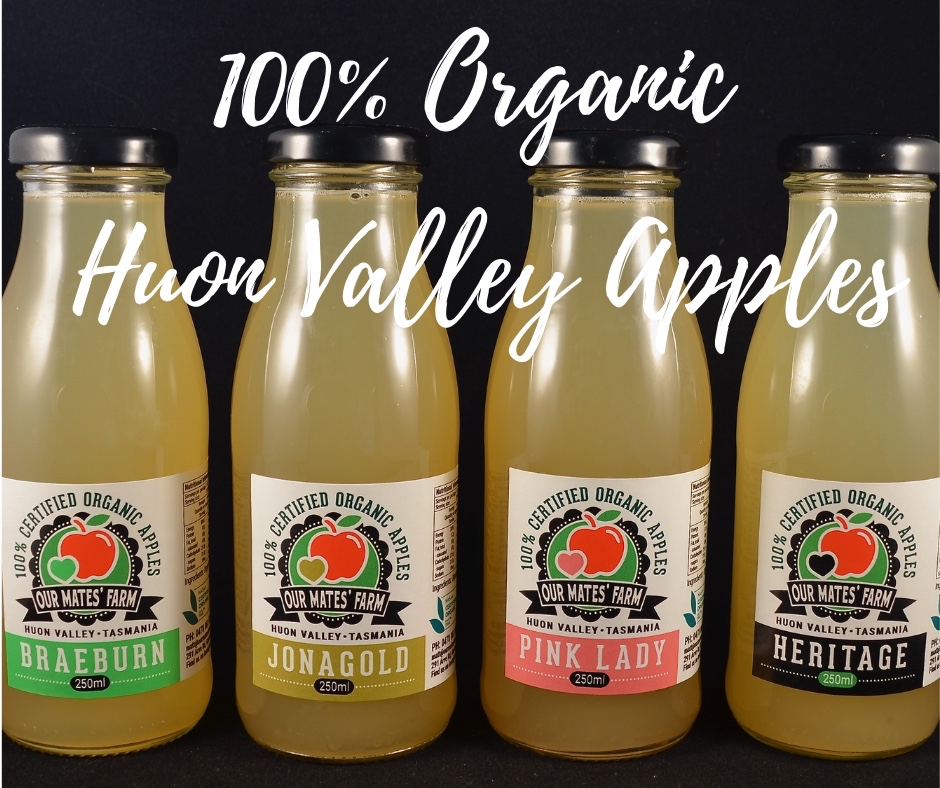
It’s not apple juice, it’s the juice from an apple
Well, it is time to ‘fess up, we make apple juice.
It all started out as a bad season for black spot, a cosmetic issue that apples can be affected by. They still taste good, but customers won’t buy them. In fact, there are lots of cosmetic issues that affect organic fruit. Little bumps, dimples, some russeting on the skin. The alternative is to sell them as juice fruit, but receiving $100 a bin for certified organic apples that cost at least half that to pick, and twice that to grow, doesn’t appeal to us.
And so, up against the wall, facing a season of lost revenue, we took the plunge, bought some equipment and had a go at pressing our own juice. From that first taste we were amazed at how good it was, how each apple’s unique flavour came through in the juice, and couldn’t believe that every apple juice we had ever consumed before this had all tasted, well, so much like one another.
We tried lots of different things along the way and were told we wouldn’t succeed because it wasn’t in anyone’s interest to help us. But despite that we persevered and have been quietly selling our single variety apple juices for the last couple of years.
We only use fruit we would be happy to eat, all those apples that folks can’t believe a supermarket would refuse. We put it in glass, because who wants more plastic in their lives (not to mention who doesn’t need another bottle for homemade passata)? And we pasteurise it quickly and cool it quickly, to preserve the unique flavour of the apple that’s on the label.
At the moment we have Jonagold juice in abundance, we have done a limited run of Cox’s Orange Pippin under our Heritage label, and soon plan to add more Braeburns and Pink Ladies to the mix.
We have trialled both 1L and 250ml bottles in the past, however at the moment we are focused on the 1L bottles as people move to consume more at home. We have these (as well as our apples) available with our good friends at Unpacked in Kingston and are now looking for more stockists.
And as a kid who tried our juice at a festival one day was overheard to say “No mum, it’s not apple juice, it’s the juice from an apple”. And we think that’s the difference.
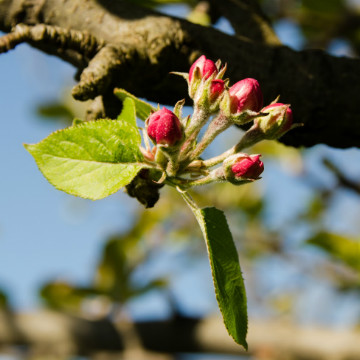
Springtime in the orchard
It’s spring! A few of our apple trees are starting to wake up. The latest picked always seem to be the first to bud!
It’s the busiest time on the farm, especially on the orchard front. We haven’t quite finished our pruning (a winter job that always slides through into late spring – eek), and the warming temperatures and rain events also mean the start of organic spraying. Plus the weeds in our home garden are happily growing along with all the sun and rain!
Thanks to our mates at Fat Pig Farm – a tiny cameo on ‘The Gourmet Farmer’, and apparently their weekly newsletter! – we have seen a few drop-ins on our website, with increasing interest in our orchard pork and lamb. So here’s a small update on what we have available:
- Our lamb will be available around Dec/Jan and again in April/May, once we have tested a lamb or two for ourselves and are happy with the quality.
- The next pork sides will be available in mid October. However these have nearly sold out.
- We have plenty of pork sides available from mid-November. These is the pre-Christmas batch and will include whole bone-in leg ham!
- You can buy our certified organic apples from Harvest Feast at Saturday’s Salamanca Markets, or Unpacked Wholefoods in Kingston (plus our juice and dried apples), as well as our small honesty-box stall at our farm gate (apples+juice+dried).
- We occasionally have beef boxes available, if you are interested we can pop you on a wait list.
For information on what you get in a pork side, we have a handy info sheet in the Contact/Orders page, as well as a great unpacking video on the May 7 posting (scroll down in Latest News). You can send us a message, or drop in an order form and we will get back to you with more information!
Follow us on Facebook or Instagram (@ourmatesfarm) for regular updates.
Happy springtime, with all the potential it brings!
Cheers,
Matt & Cor
Our Mates’ Farm, Geeveston

Orchard Lamb orders now open
Hi folks
If you have missed out on our January orchard pork, don’t cry… We have beautiful orchard lamb ready for you! An English heritage breed that is raised solely for meat, these Wiltshire Horn lambs are tasty and tender.
We are taking orders for whole lamb (only) – our standard cutup includes roasts, chops, and mince. We charge $12/kg on hookweight, with the lambs averaging 20-24kg. You can request ‘light’ or ‘heavy’ in the order form message box if you prefer a smaller or large lamb.
Navigate to the Contact & Orders page to order.
We deliver to the Huon Valley, Hobart & surrounds, and Kingborough areas.
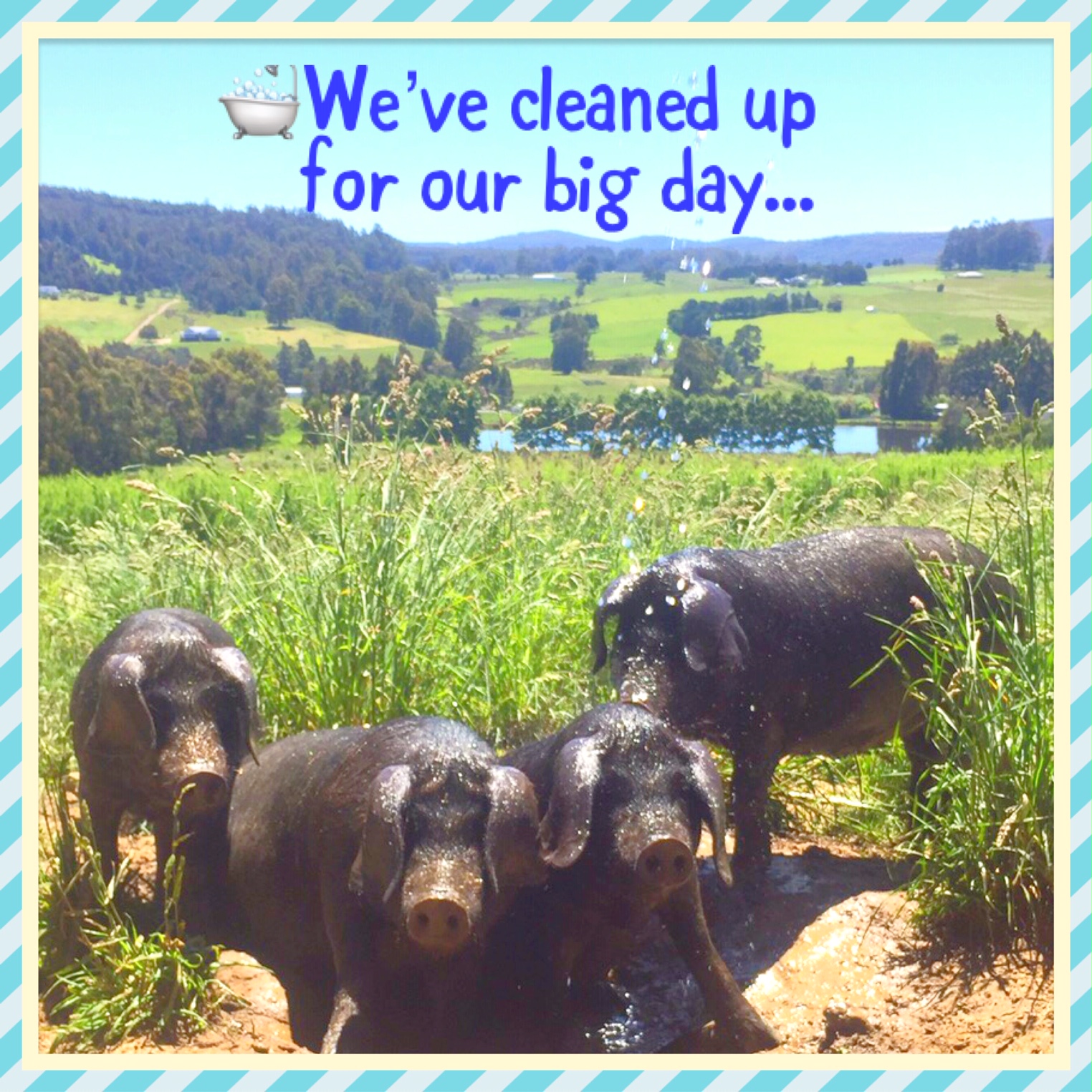
January pork orders now finished
JANUARY ORDERS ARE NOW CLOSED.
Sorry if you missed out.
More pork should be available in May.
Hi folks!
We are taking new orders for our orchard pork. These pure heritage breed Large Black pigs are truly free range, and are finished on our own certified organic apples.
Our standard half-a-pig cutup includes dry-cured, nitrate-free, applewood smoked bacon, leg roasts, chops, ribs, mince, rolled shoulder roasts and even extra crackling. We can also do something special if you wish.
We have 14 pigs ready right now, with expected delivery dates of 8/2, 15/2, 22/2 and 1/3.
Head on over to www.ourmatesfarm.com and click on Contact & Orders for more information. And if you aren’t sure what exactly you get when you buy half a pig, click on the Latest News page for a video where we show you!
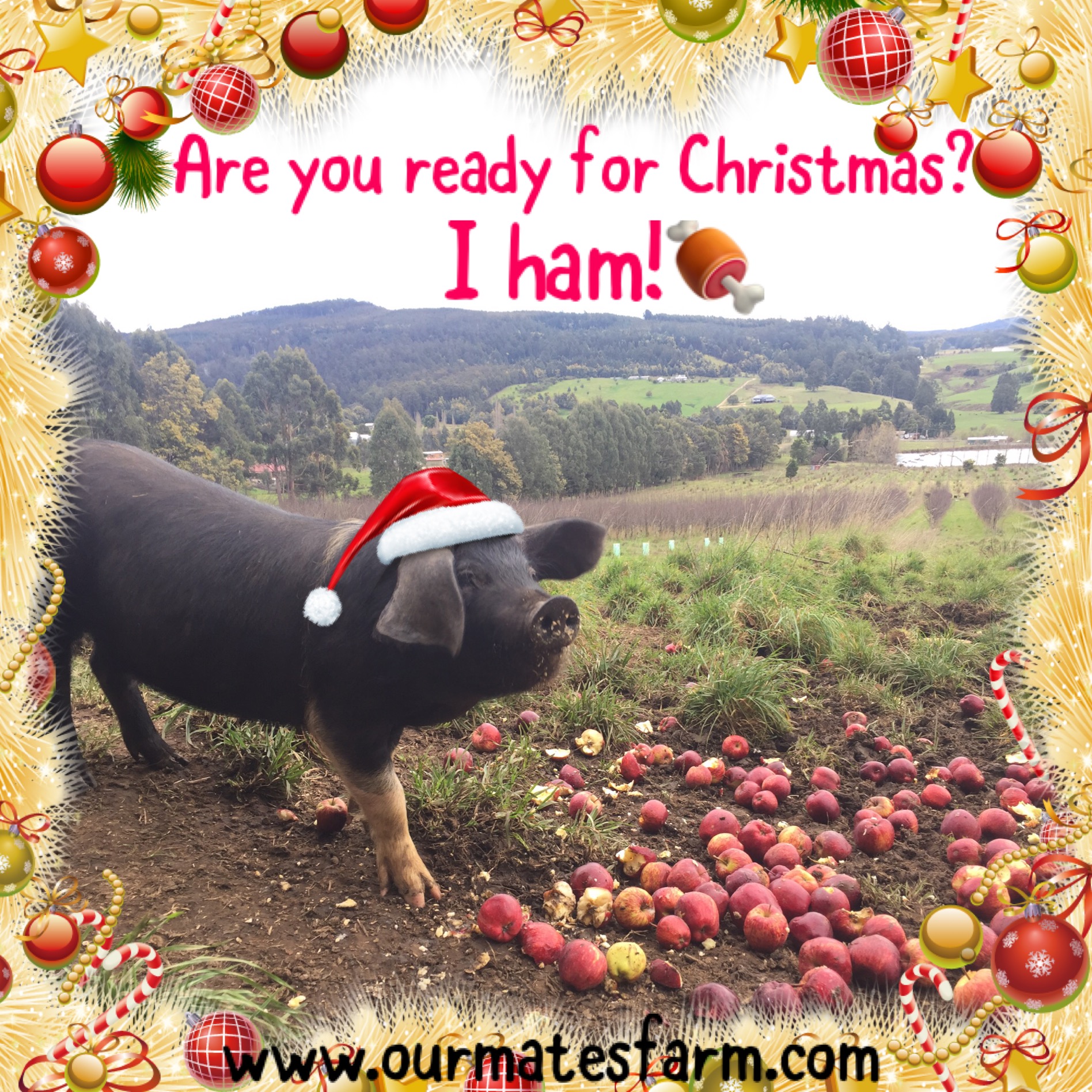
Christmas pig-in-a-box!
ALL PRE-CHRISTMAS PORKERS ARE SOLD OUT
SORRY!
If you haven’t already received a confirmation email from us with the dates & details of your pork | ham | bacon, it is too late!
We will keep you posted on our next availability.
Well we have been a little quiet the last few months, we settled into a bit of a rhythm going to Willie Smiths market every fortnight, eventually going every week with the Huon Producers Network. We sold our last 2 litters of pigs in September and we were waiting while our next 2 litters grew up ready for market. Well, now that time has come, and it is just in time for Christmas, so we have a very special offer for you all!
For any orders placed prior to Saturday 17 November our standard cutup will include a bone-in smoked Christmas ham instead of bacon. If you still want our tasty bacon for that Boxing Day breakfast (or as a gift for the hard-to-please carnivore in your life) we can include that as well for an additional $25.
If this sounds like all kinds of delicious go onto our order page here and secure your Christmas ham today before they are all gone!
Unboxing half a pig!
One of the questions we get asked the most is “How much room do I need in my freezer for half a pig?”, followed closely by “What is included when I buy half a pig?”. So we thought we would answer both questions with this little video!
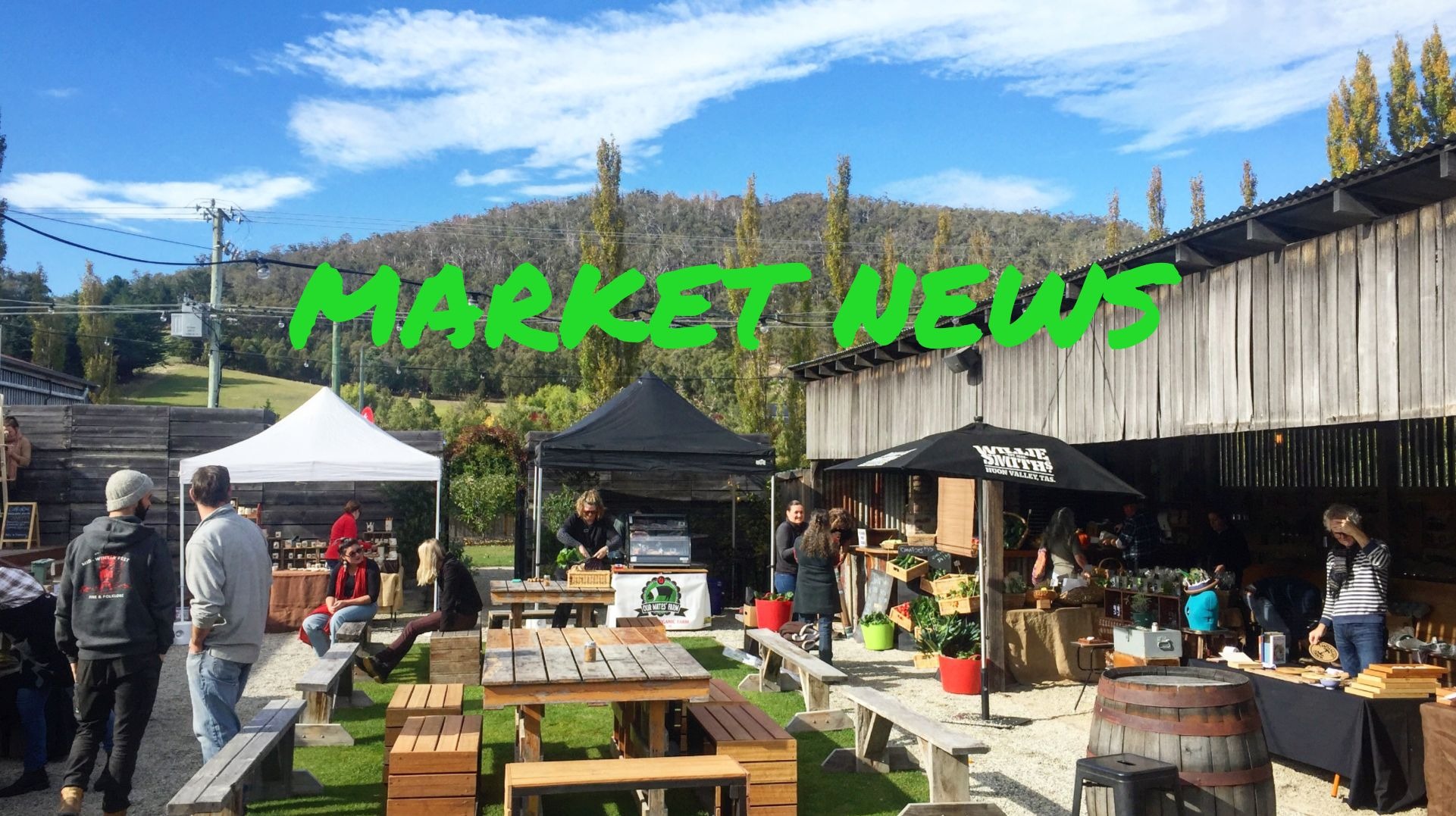
Come see us at Willie Smiths!
That’s right, for a limited time we will be at the Willie Smiths Artisan and Produce Market, filling in for Luke and his awesome Whitegrove Farm pork. We had a great day there a couple of weeks ago and we plan to be there every second week for the next 5 weeks filling (21 April, 5 May, 19 May). Come along and get a taste of our free range, apple-finished pork. We will also have our dry-cured, nitrate free, apple-wood smoked bacon for sale. We know that sounds like a mouthful, but trust us, it’s delicious!
In other exciting news we have sold all of our March orchard porkers, and we are now taking orders for the next group that will be ready in late May/early June. Get onto the orders page and get your order in. And remember, every side includes apple-wood smoked bacon…. yum!